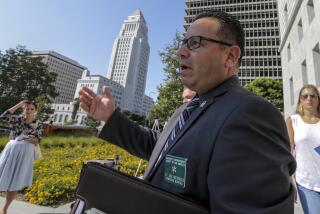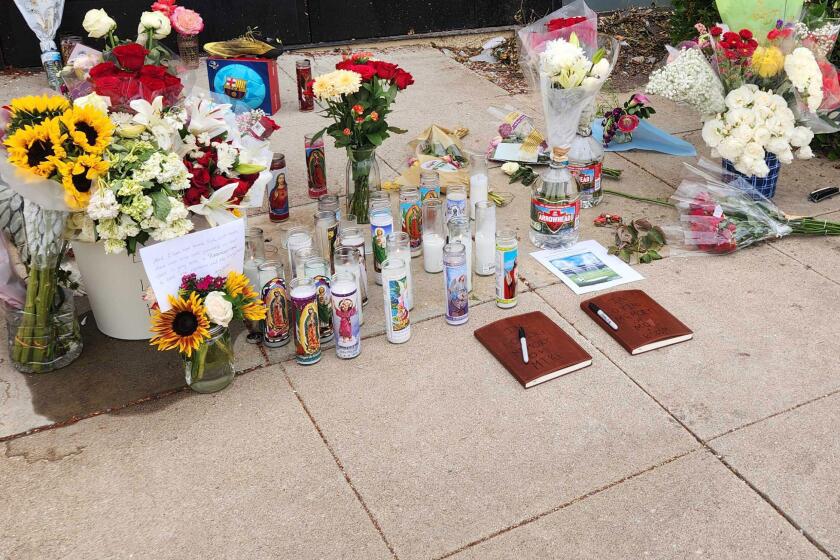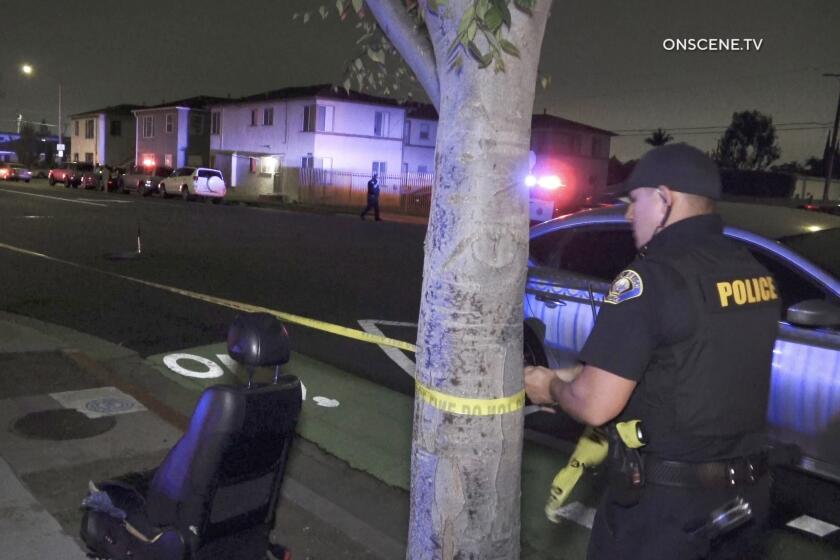Judge Halts Work on Signs
A Los Angeles Superior Court judge on Thursday granted the city’s request to temporarily block the installation of up to 25 billboards on land owned by the Metropolitan Transportation Authority until a hearing can be held on the matter.
Judge Dzintra I. Janavs told attorneys for the billboard company, STI/Outdoor, to “stop everything where it is right now so we can look at this.”
She set a Jan. 25 hearing for both sides to make arguments on whether STI/Outdoor should be permanently blocked from installing the billboards along some of the county’s most heavily traveled freeways.
The court action Thursday halted, at least for now, work that has become the latest test of wills between local government and the billboard industry. Faced with community complaints about blight, city officials are seeking to restrain the spread of billboards, while the companies that make them are waging a spirited campaign to expand their presence.
In the current case, Los Angeles officials have accused STI/Outdoor of violating a contract that gave the company permission to put up 41 billboards and 10 kiosks on MTA property in Southern California in exchange for the installation of toilets in MTA facilities and a share of billboard profits of at least $23 million.
Under the agreement, officials said, the billboard company was required to receive city approval before installing the giant signboards along freeways.
The state Legislature also weighed in on the matter last year. Lawmakers backed legislation by state Sen. Richard Polanco (D-Los Angeles) that required billboard companies to obtain the necessary local permits before building on MTA property. That law took effect Tuesday, just hours after the billboard company started construction on the new signs.
Attorneys for the company said Thursday that STI/Outdoor officials acted within the provisions of the contract with the MTA.
“I believe we will succeed on the merits when the matter is heard in a couple of weeks,” said attorney Ellen Berkowitz, a partner with the firm of Manatt, Phelps & Phillips. “We have a valid contract with the MTA and the project is . . . exempt from local regulation. . . . The city does not have the right to require that we get local permits.”
Billboards have become a major point of controversy in Los Angeles. The proliferation of the signs has drawn the interest of city officials interested in controlling their spread. Last spring, the City Council issued a moratorium on new billboard permits to give officials time to come up with new restrictions to help reduce visual blight and put teeth into efforts to remove illegal signs.
As a result, city officials say, they are determined to stop STI/Outdoor, a joint venture with Viacom subsidiary Outdoor Systems, from moving forward with plans to finish the giant signboards. Those signs are slated to be put up in the central Los Angeles area and the San Fernando Valley.
After learning of the firm’s action on Tuesday, the city filed a civil complaint--which could result in monetary damages--alleging that the billboards are a nuisance and represent unfair business practices.
“Behind us stands an illegal billboard that Viacom tried to erect in the shadows, over the holidays when they thought no one was looking,” City Atty. Rocky Delgadillo said during a news conference near an MTA bus depot at 16th and San Pedro streets, where a barrel-sized steel billboard post had been partially constructed.
“These illegal tactics will not stand,” he added. “We will do everything in our power to tear down these billboards and make this company pay for its actions.”
County Supervisor Zev Yaroslavsky, who serves on the MTA board, echoed Delgadillo’s concerns at the news conference.
“They had a deal, a legally binding deal, that in exchange for their right to put up billboards, they had to first get the permission of the local jurisdiction where the billboard was going to be erected,” Yaroslavsky said.
“They knowingly tried to breach and did breach a contract. So, aside from the restraining order . . . they now find themselves, in the opinion of the MTA and its lawyers, in breach of contract.”
More to Read
Start your day right
Sign up for Essential California for news, features and recommendations from the L.A. Times and beyond in your inbox six days a week.
You may occasionally receive promotional content from the Los Angeles Times.






